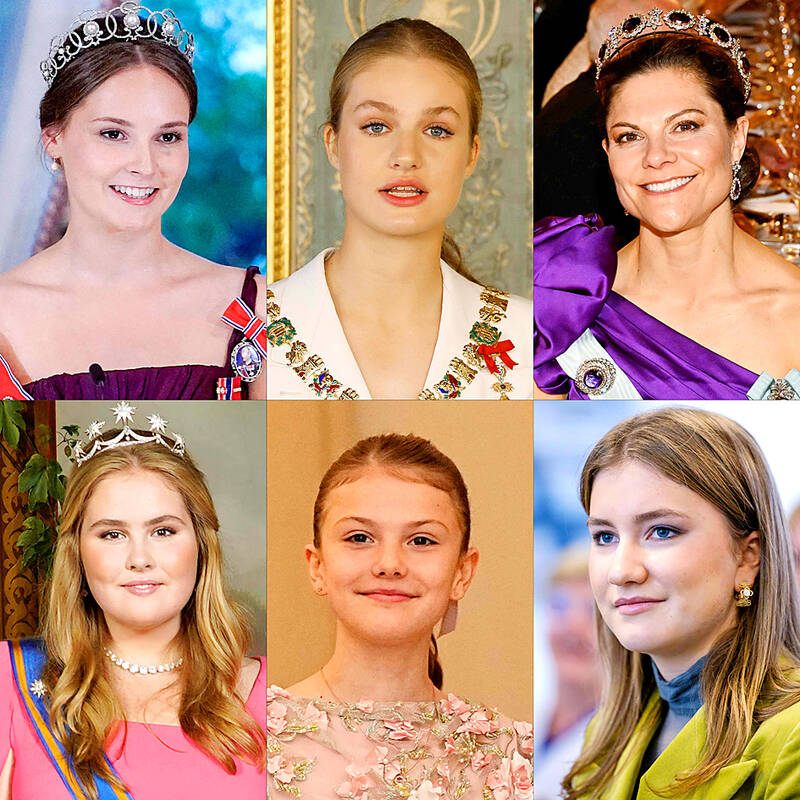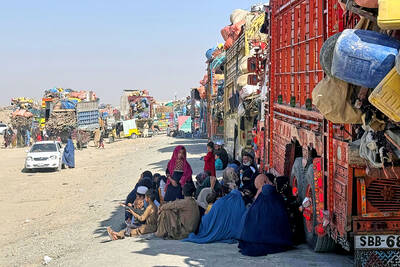The abdication of Queen Margrethe II of Denmark leaves Europe without a female monarch, but not for long — a young generation of princesses born in the 21st century are to ascend to thrones across the continent in the coming years.
Princess Elisabeth of Belgium, born in 2001; Princess Catharina-Amalia of the Netherlands (2003); Princess Ingrid Alexandra of Norway (2004); Leonor of Spain (2005); and Estelle of Sweden (2012) — half of the hereditary monarchies on the continent are likely to be led by a queen before too long.
Many are to be the first to take the throne after the introduction of female succession laws, a privilege previously reserved for male heirs.

Photo: Various sources, via AFP
Previous queens, such as Elizabeth II of Britain, who died in 2022, had no brothers to inherit the throne.
“Sweden was the first country in the world to adopt a gender-neutral order of succession, in 1980, when Princess Victoria bumped her younger brother down and she became crown princess” retroactively, Swedish royals expert Roger Lundgren said.
Several experts said gender was unlikely to have much of an impact as the future queens embrace their new roles.
Lundgren said that unlike earlier generations of queens, many in the upcoming generation has done some form of military service in their country.
In December last year, Spain’s Hola! magazine showed Crown Princess Leonor in combat camouflage taking part in ski drills with her unit on slopes in the Pyrenees.
Other princesses have studied in elite schools at home or abroad — both Leonor and Elisabeth studied at Atlantic College in Wales — exposing them more to global affairs and concerns such as feminist causes or the risks from climate change.
“A clearer, firmer footing in the everyday life of the people, in combination with the pomp, castles, jewels and the fairy tale, is the winning concept to keep the monarchy,” said Ebba Kleberg von Sydow, a Swedish influencer and royals expert.
She said the future queens were likely to prove more media-savvy as well, if only to show that monarchies remain grounded and relevant in modern society.
Lundgren said that while Margrethe “doesn’t even own a smartphone, and is proud of it,” Crown Princess Victoria of Sweden, Crown Prince Frederik of Denmark and Crown Prince Haakon of Norway have their own WhatsApp group.
“You need to be on more platforms, have your message reach people in a completely different way, now that traditional media channels that previous generations of royals used no longer reach everyone,” Von Sydow said.
In many ways, Europe’s future queens are to be wrestling with new iterations of the question that has often confronted their ancestors.
“Each new generation of monarchs has had to face one main challenge, and not the least: the questioning of what is the use of a monarchy,” said Lisa Castro, a royals historian at the University of Toulouse.
In this regard, she said, being tuned in on issues like women’s and LGBTQ causes or environmental concerns is to be a tool for ensuring the public’s backing.
“It’s inevitable that modern times will have an influence on the institution of the monarchy,” Spanish journalist Pilar Eyre said, mentioning the polished image management by Prince William of Britain and his wife, Kate.
Meanwhile, his brother, Prince Harry has moved to California with his American-born wife, Meghan, previously an actress — the latest of several examples of modern royals tying the knot with commoners.
There is already a precedent for embracing more contemporary causes — Queen Letizia of Spain, who was a journalist when she met her future husband, King Felipe, recently visited an aid association for female prostitutes — “which would have been unheard-of for preceding generations,” Eyre said.
In 2021, then-Dutch prime minister Mark Rutte said that if she wanted, Catharina-Amalia could marry a woman under the country’s same-sex marriage laws and still ascend to the throne.
“It’s with these types of gestures that you earn the affection and respect of citizens — not with grand ceremonies and magnificent outfits,” Eyre said.

With much pomp and circumstance, Cairo is today to inaugurate the long-awaited Grand Egyptian Museum (GEM), widely presented as the crowning jewel on authorities’ efforts to overhaul the country’s vital tourism industry. With a panoramic view of the Giza pyramids plateau, the museum houses thousands of artifacts spanning more than 5,000 years of Egyptian antiquity at a whopping cost of more than US$1 billion. More than two decades in the making, the ultra-modern museum anticipates 5 million visitors annually, with never-before-seen relics on display. In the run-up to the grand opening, Egyptian media and official statements have hailed the “historic moment,” describing the

SECRETIVE SECT: Tetsuya Yamagami was said to have held a grudge against the Unification Church for bankrupting his family after his mother donated about ¥100m The gunman accused of killing former Japanese prime minister Shinzo Abe yesterday pleaded guilty, three years after the assassination in broad daylight shocked the world. The slaying forced a reckoning in a nation with little experience of gun violence, and ignited scrutiny of alleged ties between prominent conservative lawmakers and a secretive sect, the Unification Church. “Everything is true,” Tetsuya Yamagami said at a court in the western city of Nara, admitting to murdering the nation’s longest-serving leader in July 2022. The 45-year-old was led into the room by four security officials. When the judge asked him to state his name, Yamagami, who

DEADLY PREDATORS: In New South Wales, smart drumlines — anchored buoys with baited hooks — send an alert when a shark bites, allowing the sharks to be tagged High above Sydney’s beaches, drones seek one of the world’s deadliest predators, scanning for the flick of a tail, the swish of a fin or a shadow slipping through the swell. Australia’s oceans are teeming with sharks, with great whites topping the list of species that might fatally chomp a human. Undeterred, Australians flock to the sea in huge numbers — with a survey last year showing that nearly two-thirds of the population made a total of 650 million coastal visits in a single year. Many beach lovers accept the risks. When a shark killed surfer Mercury Psillakis off a northern Sydney beach last

‘NO WORKABLE SOLUTION’: An official said Pakistan engaged in the spirit of peace, but Kabul continued its ‘unabated support to terrorists opposed to Pakistan’ Pakistan yesterday said that negotiations for a lasting truce with Afghanistan had “failed to bring about a workable solution,” warning that it would take steps to protect its people. Pakistan and Afghanistan have been holding negotiations in Istanbul, Turkey, aimed at securing peace after the South Asian neighbors’ deadliest border clashes in years. The violence, which killed more than 70 people and wounded hundreds, erupted following explosions in Kabul on Oct. 9 that the Taliban authorities blamed on Pakistan. “Regrettably, the Afghan side gave no assurances, kept deviating from the core issue and resorted to blame game, deflection and ruses,” Pakistani Minister of